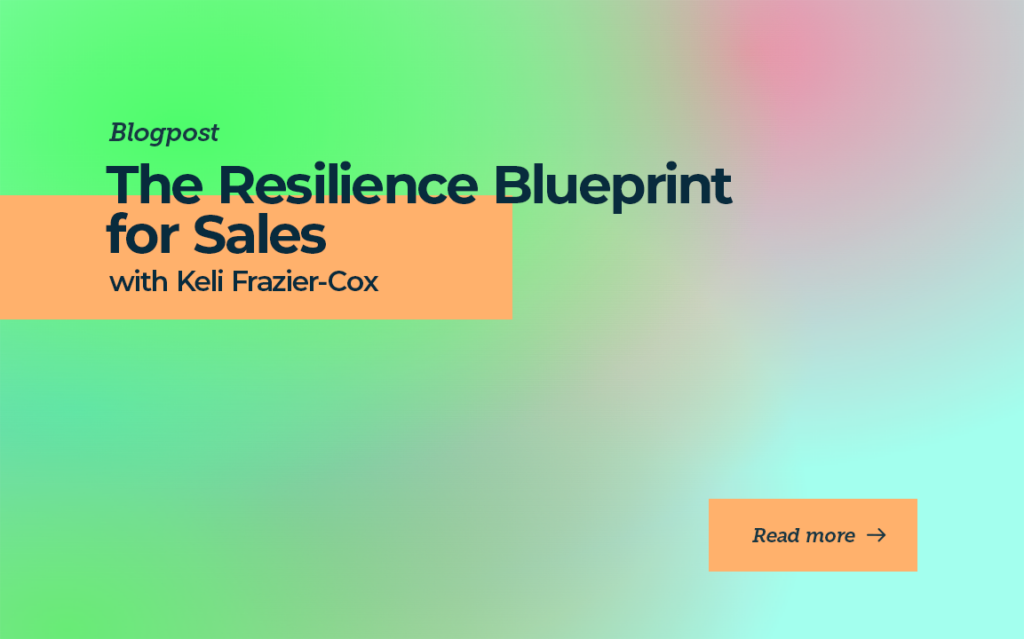The Resilience Blueprint for Sales with Keli Frazier-Cox

In today’s unpredictable sales world, resilience isn’t just a bonus; it’s the key to lasting success. Sales folks are facing more demanding challenges than ever, especially post-pandemic. In the latest Predictable Revenue podcast, Collin Stewart chats with Keli Frazier-Cox, diving deep into what’s up with sales today.
Navigating modern sales feels like a maze, especially with the economy’s ups and downs. But here’s the good news: a strong mindset and flexibility can be game-changers.
In this blog post, we’re breaking down the podcast’s best bits. We’ve got insights, standout quotes, and real-world examples perfect for anyone in sales. Whether you’re leading a team or just starting, join us to learn how to thrive, no matter the challenge.
The Ever-Evolving Landscape of Sales and the Resilience Within
Navigating the 2001 sales landscape, Keli Frazier-Cox reminisces about printed maps and in-person meetings. But against the dot-com bubble and 9/11 backdrop, she realized sales wasn’t just sealing a deal; it was about genuinely listening.
This approach built trust beyond a single transaction, emphasizing a client’s business needs and emotional challenges.
Contrast this with a young salesperson who lost a massive deal when their company tanked. Despite the setback, they showcased character by prioritizing their client’s needs.
In sales, it’s not just about the ups and downs. It’s about our values: empathy, integrity, and a deep-rooted commitment to the customer, especially during turbulent times.
Realistic Optimism in Sales
Keli introduces a fresh perspective on approaching sales: the “realistic optimist.” Here’s what it entails:
- Anticipate Challenges: Confidence in hitting sales goals is vital, but recognizing potential hurdles is equally crucial. By foreseeing these obstacles, you’re better prepared when they arise.
- Be Proactive: Many salespeople hesitate to address possible challenges, fearing it could jeopardize the deal. Keli emphasizes that these issues will inevitably surface, often at less-than-ideal times. Addressing them head-on prevents them from becoming deal-breakers.
- Forge Value-Driven Partnerships: Guiding prospects through potential pitfalls transforms your role. You’re seen as a valuable partner rather than just a salesperson, highlighting your commitment and expertise.
- Role of Leadership: Leaders set the tone. Instead of merely pushing to close every opportunity, emphasizing quality and adopting a realistic optimism approach leads to more sustainable sales strategies.
Understanding Major Organizational Changes and Their Implications in Sales
When clients look to make a substantial investment, they aren’t merely purchasing a product. They’re reshaping an aspect of their organization. With significant financial decisions come great responsibility and implications.
- Salespeople as domain experts: Salespeople act as guides beyond the transaction. Their role isn’t just to sell and steer the client through change. They offer value even without sealing a deal.
- The power of realistic planning: Clients, driven by optimism, may underestimate timelines. For instance, foreseeing that legal reviews span months can align expectations and reduce future hassles.
Sales aren’t just about the close. It’s a partnership. When challenges emerge, salespeople who work alongside clients to address them shift from mere vendors to trusted partners.
- Timelines and their significance: Sales cycles differ. If aiming for Q4 results in September, one must consider the typical duration of their sales cycles. A three-month process demands a different strategy than an eight-month one.
Transparency is the cornerstone of enduring sales relationships. Admitting misunderstandings or outlining what your product doesn’t offer can foster trust.
- Celebrating the journey: In challenging times, every little win counts. Celebrating milestones, like securing an executive meeting, maintains morale. It’s not just about the outcome but the process leading to it.
When salespeople embrace these principles, they ensure a more collaborative, transparent, and rewarding experience for all parties involved.
The Essence of Resilience in Sales
Sales have prospered over the past decade, especially in the tech sector. However, recent shifts challenge even the top performers. Amid these changes, resilience becomes central.
In this context, resilience is about enduring adversity, adapting, evolving, and progressing. This notion differs from grit, which is about persistence. Resilience also means balancing effort with personal well-being, recognizing when to push forward and when to rest, and ensuring productivity and mental harmony.
Moreover, resilience in sales isn’t only an individual trait. A team aspect is how sales professionals band together, learn, and strengthen ties. This collective resilience can guide newcomers in the sales environment.
In our changing sales world, embracing resilience—both individually and as a team—is not just about weathering challenges but growing amidst them.
Resilience in the Face of Adversity
Every seasoned salesperson knows the journey isn’t just about easy victories. Sometimes, it’s less about pushing and adapting to new strategies.
Keli’s journey sheds light on this. She balances perseverance with the ability to recognize when a change is imperative. Her experience underscores the importance of an external viewpoint. Sometimes, we’re so focused on immediate targets that we miss the larger picture. It’s not merely about revisiting our tactics but understanding if hidden strategies or adjustments are required.
Keli’s path also emphasizes that resilience is a team effort. Our colleagues, mentors, and teams are pivotal in guiding us through sales’ unpredictable terrain. They provide fresh insights and emotional and strategic backup, ensuring our well-being.
Challenges should be seen as opportunities. Past adversities and the tweaks made post-setback have molded our current strategies. Recalling these past lessons is vital for current success and future growth.
Ultimately, success in sales is about learning from the past, relying on our support network, and evolving with the times. It’s about more than just surviving—flourishing despite challenges.
Building a Resilient Sales Team
A team’s long-term success hinges on adaptability, a growth mindset, and problem-solving abilities. The pillars? Robust leadership, varied strategies, and the bravery to confront difficulties directly.
The cornerstone of a resilient sales team is effective leadership. In trying times, the ability to steer the team and keep momentum is paramount. Great leaders turn obstacles into opportunities for development.
A sales team’s strength also derives from its diversity—not just in background but in thought. Varied perspectives lead to a comprehensive grasp of challenges and a broader arsenal of solutions. Every member’s distinct input enhances the team’s collective adaptability, preparing them for diverse scenarios.
For newcomers in sales, the initial stages can be daunting. Their reactions to early challenges can influence the team’s spirit. Today’s trials become tomorrow’s lessons as they traverse their roles’ intricacies. Nurturing and supporting these rookies fosters a resilient team culture.
A significant aspect of resilience is mutual support. Contrary to some beliefs, seeking help isn’t a weakness; it demonstrates a commitment to personal growth and team success. Teammates standing by one another amplify their collective resilience.
Drawing knowledge from experts, like Keli from Promote Leaders, is also invaluable. Their seasoned insights offer practical approaches to foster resilience. Staying receptive to external guidance brings in fresh outlooks and time-tested strategies.
Conclusion
Resilience has become a cornerstone for success in sales. Keli’s insights emphasize the importance of genuine listening, realistic optimism, and valuing partnerships over mere transactions.
The post-pandemic era underscores the need for adaptability. For sales professionals, true success lies beyond just closing deals. It’s about forging relationships, anticipating challenges, and maintaining a growth mindset.
A resilient sales team characterized by diverse perspectives, leadership, and mutual support promises immediate victories and enduring prosperity. Drawing from past lessons, leveraging support networks, and being transparent with clients are central to this approach.
Ultimately, sales aren’t just about transactions; it’s about the relationships we foster, the challenges we navigate, and the resilience we demonstrate.
NO TIME TO READ?
Listen On:




